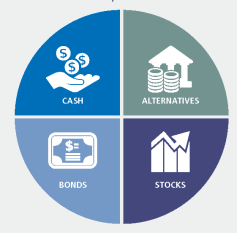Advisor Resources
OVERVIEW
CNL ALTERNATIVE INSTITUTE
ALTERNATIVE INVESTMENTS
PRIVATE CAPITAL
WHAT IS AN ALTERNATIVE INVESTMENT?
Alternative investments represent asset classes of just about anything outside the realm of traditional stocks, bonds and cash equivalents. Many investment options fall into this category, including but not limited to, real estate, commodities, hedge funds, private debt and equity.
Alternative investments, or alternatives, have gained favor among financial professionals in recent years. As markets have become more unpredictable, investors have sought assets that are less correlated with the variations experienced with daily market pricing. This has advanced an allocation model with four general investment options:
- Traded stocks, where a company issues securities representing ownership in a company.
- Bonds, where a company borrows money for a specific time period at a fixed interest rate.
- Cash equivalents, such as actual cash or assets that can be quickly converted into cash.
- Alternative investments, such as real estate, commodities, hedge funds, private debt and equity.
Large institutional investors have invested in alternative investments for years and now certain individuals have the opportunity to invest in these assets.
Institutional investors invest with strategies, terms and conditions different from those of individual investors, who typically have a shorter investment time horizon, lower risk capacity, greater liquidity needs and pay higher fees and expenses for retail offerings.

The diagram is for illustrative purposes only. Asset classes can be allocated in varying amounts to help meet an individual’s personal investment needs.
Alternative investments can be traded and non-traded. Traded alternatives can be bought and sold just like stocks or bonds on public exchanges. The advantage here is that investments in traded alternatives are highly liquid.
Alternately, there is no secondary marketplace for non-traded investments — which are typically only available to qualified investors through their financial professional — making the investment comparatively illiquid. Non-traded alternatives offer a diversification option for the higher risk long-term investment portion of certain qualified investors’ portfolios.
Diversification does not guarantee a profit nor protect against losses. Risk/reward profile for each asset class varies significantly. Alternative investments are considered speculative, involve significant risks and complete loss of principal.
